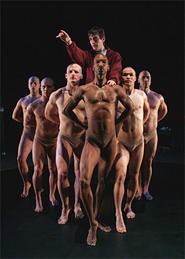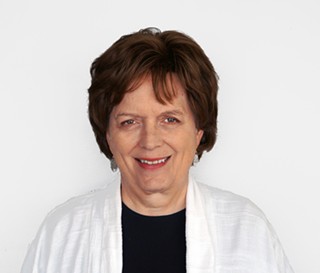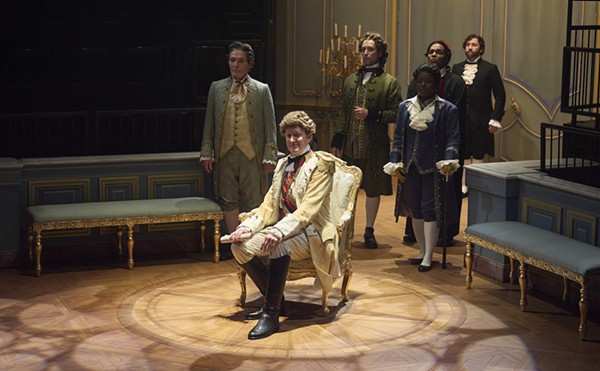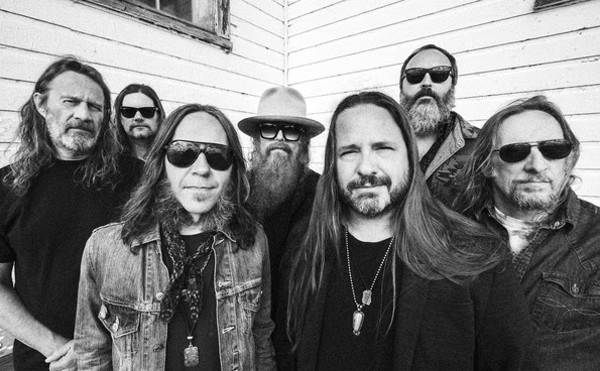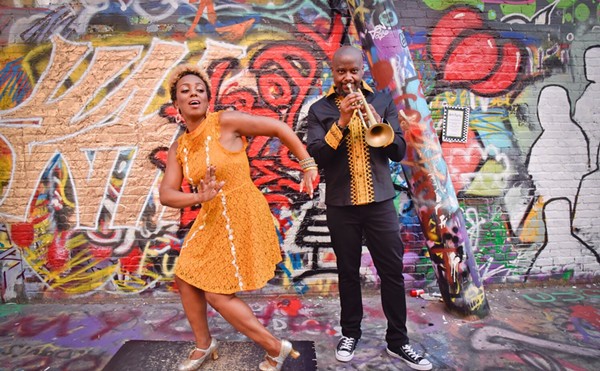If that test were applied to the theatrical experience of Equus, now at the Beck Center, the audience would easily spend half its time gazing into the rafters. But that would be inadvisable, since this production is so visually stunning in places, it beggars description. And even though there are a few wrinkles in the execution, the overall impact is absolutely captivating.
Written by Peter Shaffer, Equus (that's horsie in Latin) opened on Broadway in 1974 and created a dustup of controversy surrounding the plot, about a teenage boy who blinds six horses with a spike, not to mention the frontal nudity that takes place in the climactic second-act scene. Since then, the play has become a cultural touchstone representing alienation and psychosexual torment. It was even parodied last year in the satirical newspaper The Onion, in an amusing "report" on a production of the play by a second-grade class in Virginia.
Though a half-dozen Mr. Eds occupy a pivotal role, this is not a play for the younger set. Alan Strang is the 17-year-old who has mutilated the horses while working as a stable hand and is under the care of Dr. Martin Dysart at a psychiatric hospital in England. The script attempts to suss out why the adolescent would harm the very animals he idolizes and reveres to the point of obsession.
Some of this shrink-inspired speculation amounts to pretentious hog wallow. For instance, when the image of a horse wearing bridle and reins is referred to, "Equus is in chains for the sins of the world," the overreach is borderline ludicrous. But many of the subthemes tap into rich veins of philosophical, familial, and sexual tension. As the treatment of Alan progresses, Martin, who is locked in a loveless marriage and a mediocre career, begins to question his role: "This boy knows a passion more furious than any I've had. And I'm jealous."
Also fascinating is the interplay between Alan and his parents, demanding but hypocritical father Frank (a spot-on Geoffrey Darling) and overtly religious Dora (Lenne Snively). It surprises Alan when he and his pops inadvertently wind up at the same skin flick ("He's not just a dad, he's a bloke with a prick!"), in one of the only comic moments in this engrossingly complex work.
Director William Roudebush, scenic designer Don McBride, and lighting designer Trad A. Burns have totally deconstructed the main stage at Beck, creating a bare central platform with seating on two sides and lights coming from all directions. The effect is often astonishing, particularly when the horses -- portrayed by male actors clean-shaven from skull to soles -- appear clad only in flesh-tone dancer briefs. Their equine gestures and ensemble prancing, choreographed with subtle precision by Martin Cespedes, are remarkable and mesmerizing.
The talented cast contributes performances that, while not perfect in all instances, always carry the story forward. Matthew Wright is rumpled and natural as doc Martin, an ordinary man haplessly trying to deal with mad passion in a way faintly echoed by Salieri's relationship with Mozart in Amadeus. However, Wright often speeds through his dense and overwritten speeches, not allowing time for the character to even think of the words he's speaking. As Alan, Dan Folino is a convincing teenager, complete with the obligatory scowl and screw-you shrug, but the boy's crystal-pure adoration of horses is often hidden in shadows.
In a production where almost every second is sculpted with breathtaking effectiveness, there is one exception. During the reenactment of the tragic event, the horses paw at the floor nervously, and the stage is literally set for a transformative moment. But by making Alan and the horses shuffle around to different areas of the stage in the dark, the blackouts between the ghastly tableaus take too long, and the scene lacks the tautness that could have twisted the audience into a quivering ball.
That, however, is a small quibble in a show where even one horse is worth the price of the ticket. And that one horse -- Alan's favorite, named Nugget -- is played by tall and slender Franklyn Singley with a grace and noble presence that is almost otherworldly. His sinewy and lithe movements will stay with you, even long after you've stopped discussing this play's intriguing issues.

